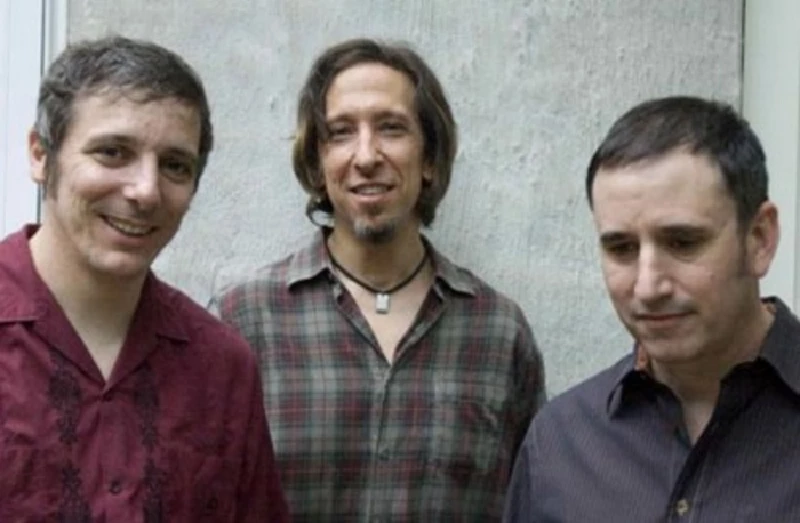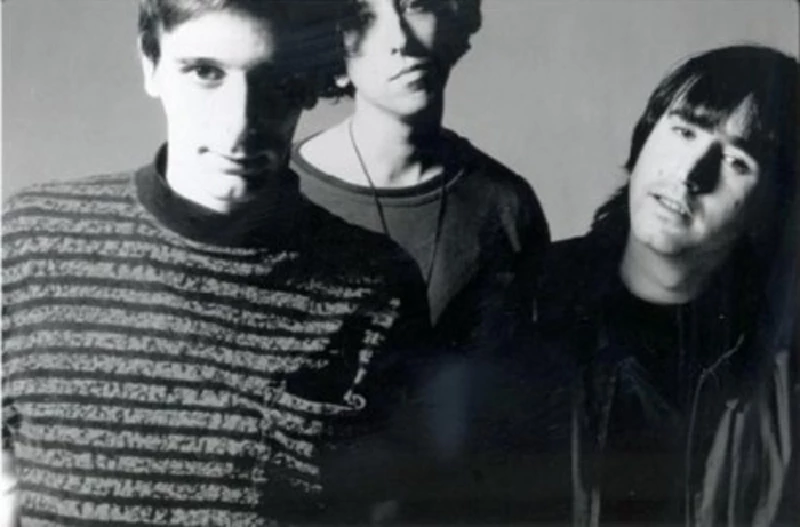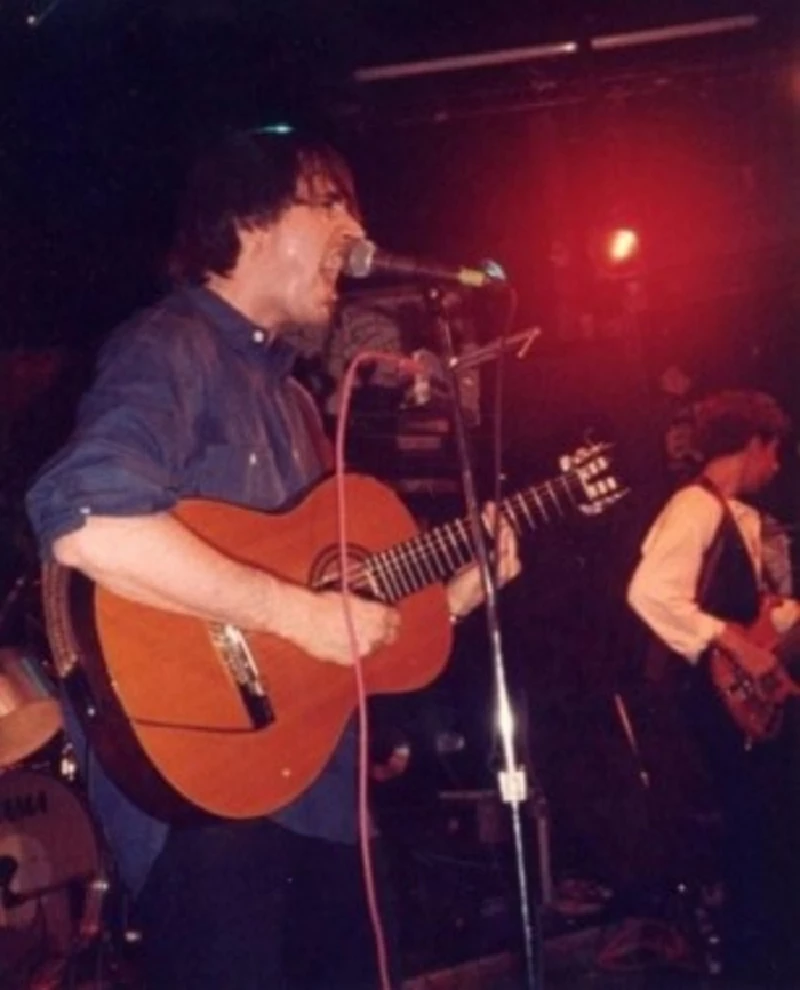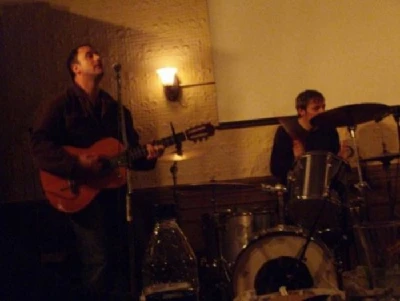Springhouse - Interview Part 1
by John Clarkson
published: 11 / 1 / 2009

intro
An indie New York-based trio of the late 80s and early 90s, Springhouse have recently returned with a new album, 'From Now to OK'. In the first part of a two part interview, both of which we are running together, members Mitch Friedland, Larry Heinemann and Jack Rabid talk about their original split
Springhouse was a New York-based trio of the late 80s and early 90s. Formed in 1988 by Mitch Friedland (vocals/guitar), Larry Heinemann (bass/guitar/vocals) and Jack Rabid (drum/vocals), they made thoughtfully intense and emotional music with a sweeping and epic sound. Mitch Friedland’s use of a nylon string guitar which was put through a succession of billowing effects, and then propelled further forwards by Heinemann and Rabid’s gargantuan-in-tone, energetic rhythm work, gave them both a dynamism and an uniqueness. They released their first album, ‘Land Falls’, which they had recorded in 1989 and was produced by Mike McMackin, on Caroline Records in 1991, and followed this with a second album, ‘Postcards from the Arctic’, produced by Joe Chiccarelli, in 1993. Always somewhat out of sync with musical fashion, they only, however, ever achieved modest sales, despite earning a spot with ‘Land Falls’ in the UK magazine Select’s Top 50 Albums of the Year, and never toured outside the United States and Canada. They broke up later on in 1993, shortly after being both dropped by Caroline and a disastrous seven week tour. Springhouse briefly reunited in 1994 to play support to the Chameleons’ Mark Burgess on an American tour, and then again in 1998 to work on a third Springhouse album and what was originally conceived as a Mitch Friedland solo record. The album, which the band has named ‘From Now to OK’ and self-released, finally came out ten years after the band began work on it last October in a beautiful limited-to-550 copies, letter-pressed fold-out sleeve created by artist and printer and former Savage Republic bassist Bruce Licher. It is also available as a pay-what-you-want download. While the dark-in-tone first two albums frequently found Springhouse bracketed within the dream pop or shoegazing mould, the more optimistic ‘From Now to OK’, which was produced by Heinemann, is in a very different frame, taking the baroque pop influences of 60s and early 70s bands such as Pink Floyd, the Beatles and Big Star and giving them a contemporary setting. Each of the members of Springhouse lead eventful lives. Mitch Friedland is a New York Paramedic of 20 years standing, and also plays in various other projects, including a new group, Nangapark Pilgrimage, with his second wife. Larry Heinemann was until recently the Musical Director and continues to tour and play bass with the world known theatrical/musical dance troupe the Blue Man Group. He also works as a records producer, and has worked with artists Tracy Bonham and Code Mesa. Jack Rabid, the subject of two previous Pennyblackmusic interviews, founded and has been the editor and publisher for the last 28 years of the highly respected print music magazine, ‘The Big Takeover’. In an extensive interview in which we are running in two parts, both parts consecutively, Mitch Friedland, Larry Heinemann and Jack Rabid spoke to Pennyblackmusic about Springhouse’s against-the-odds survival, making music on their own terms and the endearing nature of their friendship. PB : Jack, you had been the drummer in a punk act Even Worse who went through various line-ups between forming in 1980 and coming to an end in 1984. Springhouse formed in 1988. Were you involved in any other bands in the interim ? JR : Not really. I recorded a couple of singles with a friend of mine as a favour and I did a tour with the Leaving Trains in 1986. I had met Mitch in '85 and we had become pretty good friends over the three years before we formed Springhouse. That has always been a provision of mine. If I am going to get involved in music, it has to be with someone who feels as passionately about it as I am, and who I want to spend a lot of time with. It is an extension of friendship. I have never been in a band just for being a band. It has to be with my really close friends making music that means a lot to me. PB : What about you, Mitch ? Had you been in any other groups ? MF : I had done a little solo stuff here and there ,but I had never been in a band. Jack's girlfriend at the time went to Queens College, the same college that I went to and it was through her that I became friends with Jack. Jack and I started rehearsing by ourselves, and then we put an advert in 'The Village Voice'. That was how we found Larry in 1988. LH : I had played in a lot of groups, but they were all a lot more poppy than punk or alternative. I didn’t have a whole lot of real New York indie credibility at that point. I was doing a lot session work as a bass player, but realised that I wasn’t really listening to a lot of the stuff I was playing. I was listening to a lot of punk and alternative stuff, but I didn’t view myself as a guy that would play that material or even had the right to play it. One day I just had this sort of epiphany. Why the hell aren’t I playing music that I am listening to ? (Laughs). JR : We were worried that we were going to get a bunch of people saying that they were into Heart or something like that, so we put a quiz in the ad for the bassist and said, "Name three of the following five bands for the following five bassists”. We put as the five bassists Chuck Dukowski (Black Flag-PB) , Segs Jennings (The Ruts-PB), Peter Hook, Graham Lewis (Wire-PB) and Andy Rourke, and only got two calls. One of them was from Larry and he said, “I can only name two of those five, Peter Hook from Joy Division and Andy Rourke from the Smiths. Is that okay ?" We just laughed and told him that it would be okay if he didn’t know any of them. We were just trying to weed people out. PB : Springhouse have often been categorised as a shoegazing group, yet on those first two early albums as well as the influence of bands like My Bloody Valentine and Slowdive there seems to be elements of the likes of the Comsat Angels and the Chameleons in your sound as well. Were you all predominantly at that time listening to British groups ? JR : I am not sure that I would say “predominantly”, but compared to most Americans who were listening to ninety percent American stuff and ten percent British stuff we were doing more of a fifty/fifty thing, so we got branded as Anglophiles. We were listening to all those bands that you mention. We came up with them. The first three Cure albums were a big influence too, but there were some newer bands too which were coming along like the Lucy Show which we also really liked. Of course my roots were with the Buzzcocks and the Ruts. We should have added Steve Garvey from the Buzzcocks to that quiz really (Laughs). We included Segs from the Ruts because he was a really versatile bassist and we were looking for someone with that same kind of versatility as Andy Rourke and Graham Lewis and found that with Larry. MF : We were into those bands, but the interesting thing about the guitar sound we had on those first two albums was that we created it by accident, using an acoustic guitar and a distortion box. I remember Jack and I going to a music store and me picking up a distortion box and the sales person pointing at my guitar and saying, "You're going to use that for this" and I said, "Yes" and he went, "That is going to suck.” Jack and I both started laughing, but when we took it down to the studio and tried it out we loved the sound of the guitar and that is basically how we got the distortion on the Springhouse sound. Around about that time all these other bands started appearing like Lush and Slowdive, and we thought, "Wow. We are pretty similar to a lot of these bands.” We were tagged as being a shoegazing band along with them, but it was never an intentional thing. JR : A lot of the reviews we got in the American press said that we were inspired by Lush and Ride and all those other English shoegazing bands. We were huge fans of all those groups, but we recorded ‘Land Falls’ in fact before any of them had made records. We recorded that album in February of '89, but we didn't get signed for two years. We sent it to every American label we could and it took two years before Caroline Records finally picked us up. It was the classic example of making the wrong music at the wrong time. PB : Why do you think Springhouse never broke into the mainstream ? JR : The one thing the band got was press. It didn’t get enough airplay which was the real problem. We got a feature in 'Rolling Stone' which was a real coup. We got very kind words in 'Creem' and 'Spin' and some of the bigger outlets. We got a fair amount of college play but not enough. College radio at the time was playing English, Australian and New Zealand bands who were making the sort of music that we were making. They, however, had a bias towards American bands who sounded more rough and tumble. LH : It was a very exciting time in the music world, but one that didn’t relate to what we were doing. Our first record came out pre grunge and our second record came out post grunge and what we were doing was not terribly relevant to where the majority of the energy was going. JR : 'Nevermind' completely changed the market in America forever when it was released five months after ‘Land Falls’ in 1991. If we had wanted to record an album like the Smashing Pumpkins, we might have been okay, but after that we were even more out of time than we already were. In '91, because of the shoegazing thing, we were at least able to sweep in a little on the coat tails of that, even though we had predated that stuff. MF : It wasn’t just the hair bands who got kicked out of the scene because of Nirvana. It was a lot of the shoegazing bands as well, groups like the Catherine Wheel and bands like that who came over from Britain and who were doing pretty well in the States for a while. They were building up an audience and then they couldn't build it anymore because everyone's allegiance turned to the grunge bands. JR : After 'Nevermind' came out every major label signed forty or so independent rock bands who all sounded like a bunch of kids in a basement screaming, so the subtlety of our music was completely out of season immediately. Anybody who was doing anything with subtlety suffered. I remember Kristen Hersh saying at the time she thought that quiet was the new loud. She was another one of these people who suffered for a while because she didn’t sound like Mudhoney or worse the worst kind of dregs that 'Nevermind' made possible like the Stone Temple Pilots and crap like that. PB : You would have probably done quite well in Britain given the number of shoegazing bands over there. ‘Land Falls’ made Select Magazine’s Top 50 albums of the year. Why did you never tour there ? Was it just because of lack of finance ? JR : When 'Select' put us in their Top 50 of the year for 1991, I remember thinking that we were the only band out of the whole fifty that I had never heard of. The other forty nine were really well known. I can't tell you how badly we wanted to come over to Britain. Our music seemed to make more sense in England. The radio, however, over there turned its nose up at us again and the label patently refused to give us five cents to bring us over to play even one show. They basically cut and run before they did a goddamn thing for us other than to send us out to press outlets. We got great press, but didn't sell any records. Of course we weren't going to sell any records if we didn't play there. It was like a chicken and egg thing. We couldn't finance the tour ourselves particularly if weren't going to get any support from Caroline. It was a really crushing disappointment. No doubt about it. Even when we got a 'Melody Maker' feature they still wouldn't bring us over. LH : There wasn’t quite enough interest. A little bit more interest would have gotten us over there. It was too expensive and logistically a difficult proposition for us to just show up there and do it. Probably one little bit of luck there would have made all the difference (Laughs). PB : Your tour van was broken into during a seven week tour of the States in 1993 at the cost of $6000 and Caroline dropped you at about the same time. You broke up shortly afterwards because as you have described it as you felt “broke and unloved.” How much did those two events have on you splitting ? MF : At the time my life wasn't in the best of shape anyway. That was a horrendous tour. Caroline Records knew that we were obligated to tour and they asked us if we were planning to go out on the road to promote ‘Postcards’. We said yes and if they had said to us then that they were not going to be supporting the record at all we would have said, "Okay ! We will look at our options " It sounded like they were going to support the record so we did go out and it just turned out to be awful. Some of the gigs were really great, but two thirds of them were really poorly attended and nobody could find the record in the stores or anywhere else. JR : We knew that they were going to drop us. There had been a change of presidents and they did absolutely nothing for us on that tour. They put out the album because they were contractually required to and said nice things to our faces. There were two or three employees who had worked really hard on ‘Land Falls’ and were still there and who went out of their way to work on the second album too, even though that it was clear that we were not the sort of priority the bosses expected. MF : Our tour van was broken into in San Diego. I said to myself at that point, "That's it. The tour's over. We're going back to New York." We had all sorts of obligations, however, to play the rest of the clubs, so we had to borrow guitars for the next few dates. Unfortunately I was in the same situation as Sonic Youth whereas the guitars I used were very special. We needed those guitars to make our sets work. We couldn't play the first two or three gigs properly because the guitar sounds were just awful. In hindsight we would maybe have been better just doing the shows acoustically. It was a really bad situation. JR : The van being broken into was the last straw. It wasn’t, however, really down to any one thing. Everything had gone wrong. The van being broken into was just part of it. We would go into record stores and our first album would be in the bargain bin and our new album wouldn’t be there at all. There wasn’t enough press and there was no radio at all and the attendance at our shows was declining. LH : At the end of the day the fun part of things should outweigh the non fun part of things and if it is gets to the point of being equal or maybe tipping over to being non-fun then it is probably time to move on. One of the tragedies of the situation was that it was not down to personality at all. We all liked each other immensely. I would rather have stopped there while we were still ahead in that department rather than letting that too go completely to the depths it can go to. We had made two albums that we felt good and could be proud of about. I think we all wanted to leave as much there that was as positive as we could. MF : As soon as the tour was over we met at Jack's house and we just looked at each other and said, "That's it. It's over." We just really didn’t have the strength to continue at the time. Not physically, but emotionally as well. It was a big let down to be dropped by Caroline in that manner, and there was no one else sniffing around to re-sign us. We said, "That will be it for the time being."
Picture Gallery:-


interviews |
|
Interview Part 2 (2009) |

|
| while in the second part they talk about getting back together, the new album which taken ten years to make, and making music entirely on their own terms |
most viewed articles
current edition
Peter Doherty - Blackheath Halls, Blackheath and Palace Halls, Watford, 18/3/2025 and 21/3/2025Armory Show - Interview with Richard Jobson
Liz Mitchell - Interview
Deb Googe and Cara Tivey - Interview
Lauren Mayberry - Photoscapes
Max Bianco and the BlueHearts - Troubadour, London, 29/3/2025
Garfunkel and Garfunkel Jr. - Interview
Maarten Schiethart - Vinyl Stories
Clive Langer - Interview
Sukie Smith - Interview
previous editions
Heavenly - P.U.N.K. Girl EPBoomtown Rats - Ten Songs That Made Me Love....
Trudie Myerscough-Harris - Interview
Doris Brendel - Interview
Beautiful South - Ten Songs That Made Me Love...
Dwina Gibb - Interview
Kay Russell - Interview with Kay Russell
Pulp - Ten Songs That Made Me Love...
Barrie Barlow - Interview
Sound - Interview with Bi Marshall Part 1
most viewed reviews
current edition
Davey Woodward - Mumbo in the JumboNigel Stonier - Wolf Notes
Wings - Venus and Mars
Kate Daisy Grant and Nick Pynn - Songs For The Trees
Only Child - Holy Ghosts
Neil Campbell - The Turnaround
Philip Jeays - Victoria
Darkness - Dreams On Toast
Suzanne Vega - Flying With Angels
Charles Ellsworth - Cosmic Cannon Fodder
Pennyblackmusic Regular Contributors
Adrian Janes
Amanda J. Window
Andrew Twambley
Anthony Dhanendran
Benjamin Howarth
Cila Warncke
Daniel Cressey
Darren Aston
Dastardly
Dave Goodwin
Denzil Watson
Dominic B. Simpson
Eoghan Lyng
Fiona Hutchings
Harry Sherriff
Helen Tipping
Jamie Rowland
John Clarkson
Julie Cruickshank
Kimberly Bright
Lisa Torem
Maarten Schiethart